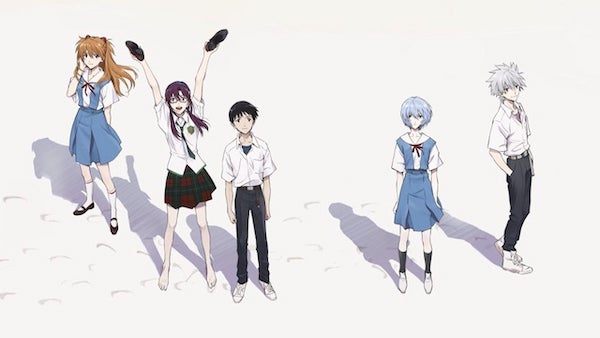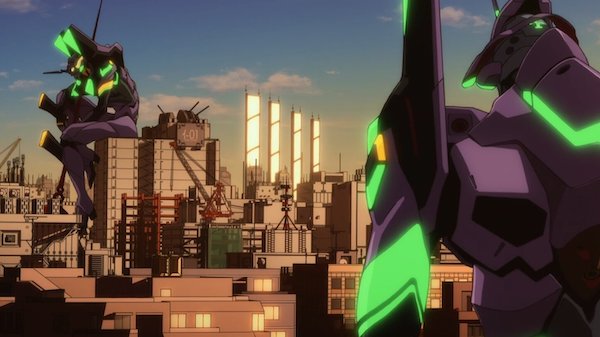Film Review: “Rebuild of Evangelion 3.0+1.0: Thrice Upon a Time” — And Remember, Take Care of Yourself
By Nicole Veneto
Evangelion is my personal Rosetta Stone, allowing me to decipher everything from psychoanalytic theory and gender relations to my very own understanding of trauma and the world that I inhabit.
Rebuild of Evangelion 3.0+1.0: Thrice Upon a Time, directed by Hideaki Anno. Now streaming on Amazon Prime.

A scene from Rebuild of Evangelion 3.0+1.0: Thrice Upon a Time.
It’s taken me a few days to write this review because a significant part of me feels like I’m grieving. If it weren’t for Neon Genesis Evangelion I wouldn’t be the person I am today. You know the way some people owe their lives to the impact of a novel they read or claim that an artist’s music “saved them” from the darkest parts of their lives? That’s what Evangelion is to me. I’m more than just a fan who channeled her love of a Japanese cartoon into collecting merchandise (at current count I have four posters and seven figurines) and cosplaying at geek conventions. Evangelion is my personal Rosetta Stone, allowing me to decipher everything from psychoanalytic theory and gender relations to my very own understanding of trauma and the world that I inhabit. Ever since I was 15, Evangelion has been there for me, a formative presence in my life that I’ve obsessively returned to over and over again. And now, 26 years after Hayao Miyazaki protégé Hideaki Anno’s magnum opus premiered on Japanese television and changed anime forever, Evangelion has come to a definitively satisfying and life-affirming conclusion.
For the uninitiated, the basic premise of Evangelion is this: 15 years after a near apocalypse known as the Second Impact kills two-thirds of the human population, a paramilitary organization known as NERV constructs a series of humanoid mechas (giant robots) as humanity’s last defense against extraterrestrial beings (Angels) to prevent a cataclysmic Third Impact. Lonely 14-year-old Shinji Ikari is called upon by NERV’s steely commander (and his estranged father) Gendo to pilot Evangelion Unit-01 as the designated Third Child, joining fellow pilots Rei Ayanami (the mysterious First Child, pilot of Unit-00) and Asuka Langley (the fiery Second Child, pilot of Unit-02). In the original 26-episode anime (1995-96), this traditional giant-robot premise eventually devolves into a psychoanalytic study of human subjectivity — defined by pain, isolation, and the ever present boundaries between the self and others — that accumulates into an assimilation plot to merge all of humanity into a single consciousness using the Evas and its pilots as pawns. In its totality, Evangelion combines the philosophical existentialism of Solaris, The Wall’s animated psychedelia, and the cryptic meta-mythos of Twin Peaks (arguably Evangelion’s closest Western equivalent). The series’ original theatrical ending, 1997’s The End of Evangelion, is an emotionally devastating tour-de-force not for the faint of heart; it’s an 87-minute existential crisis that plunges you deep into the nightmarish depths of human despair, desire, cruelty, and loneliness.
Now Rebuild of Evangelion isn’t so much a big-budget reboot of the original series as it is a stealth sequel continuing where End of Evangelion left off. But the key to understanding Evangelion and its reboot tetralogy lies with its creator, Hideaki Anno, who developed the series out of a four-year long period of clinical depression that continued to torment him throughout the original anime’s production and into its new theatrical versions. Completing the previous entry of the Rebuilds, 2012’s 3.0: You Can (Not) Redo, drove Anno to such despair that Hayao Miyazaki offered him the starring voice role in The Wind Rises to help take his mind off Evangelion for a while. Production on the final Rebuild film was subsequently delayed as Anno mentally recovered through working on other projects like Shin Godzilla, which won him Best Picture and Best Director at the Japanese Academy Film Prize. To give you an idea just how long the world has been waiting for the final Rebuild entry, 3.0 came out my first semester of undergrad. 3.0+1.0 was originally scheduled for release in June 2020, a month after I received my master’s.
To say 3.0+1.0 was highly anticipated would be a gross understatement, to say nothing of the astronomically high expectations fans held after the polarizing reception of 3.0 which took Evangelion in a drastically different — yet familiarly tragic — direction. 3.0+1.0 picks up right where 3.0 leaves off, with Shinji at the lowest he’s ever been in a world he feels responsible for destroying. While Evangelion is infamous for the dark, depressing places it’s gone to, there’s always been a glimmer of hope hovering beyond the layers upon layers of psychic trauma. 3.0+1.0 places that promise at the forefront in a way Evangelion has never done before. The result is a film that’s not only awe-inspiringly beautiful to behold but profoundly affecting, the way all great art aspires be. The best way to surmise the tonal difference between this film and the rest of the series is by comparing Utada Hikaru’s upbeat promotional song “One Last Kiss” with the deeply melancholy theme she provided for 3.0, “Sakura Nagashi” (the opening notes of which never fail to make me tear up); the latter sorrowfully (and with tragic irony) opines, “everybody finds love in the end” while the former affectionately exclaims, “I love you more than you’ll ever know.”

A scene from Rebuild of Evangelion 3.0+1.0: Thrice Upon a Time.
Since 3.0+1.0 has been so highly anticipated for so long — and because readers here may be entirely unfamiliar with Evangelion, never mind anime itself — I’ll refrain from summarizing any of its 155 minute runtime. I already spoiled enough for myself via the internet when it premiered in Japan back in March (in my defense, I didn’t think we’d get an English release for another year at least). Vaguely put, 3.0+1.0 confirms much of what Evangelion obsessives like myself have always suspected about the Rebuild series. While Anno claims to have no emotional attachment to Evangelion or its characters, 3.0+1.0 is wholeheartedly moving: there are introspective moments of growth for its cast that recontextualizes our understanding of the world in which they (and we) live. You get the sense that Anno now comprehends the pain that Evangelion embodied in his life. By allowing his characters to definitively “grow up,” Anno is telling his audiences that, once the film is over, they should make peace with the world around them. It’s like an imaginary friend taking you by the hand and gently saying, “You don’t need me anymore; I’ve done my job guiding you towards adulthood and helped you realize the power you’ve always had within yourself to persevere.” I’ve cried numerous times over the past few days just thinking about certain moments: two of the series’ most enigmatic characters are allotted a sense of personhood long denied to them; another is shown to be the bridge between different continuities; and yes, Shinji gets in the robot one last time.
Everything about 3.0+1.0 is masterful, from the pristinely detailed 2D animation and immaculately composited CG effects to composer Shirō Sagisu’s epic score. And, to my absolute delight, most of the series’ original English dub cast (which is how I first watched Evangelion all those years ago) came back to reprise their roles after Netflix went and made their own controversial dub for their 2019 streaming release. It’s like being able to say good-bye to old friends. As much as I detest the Amazon empire, I’m thankful that they extended the opportunity to the voice actors to complete the Rebuild series after all these years.
I’ve always joked that I’d be ready to leave this horrible flesh-prison behind once Evangelion 3.0+1.0 came out. But, even with further darkness looming on the immediate horizon, I came out of 3.0+1.0 with a new lease on life. It’s like opening your eyes to the inherent beauty of the world for the very first time. To Hideaki Anno, thank you. To Shinji, Rei, Asuka, Misato, Kaworu, and all the characters that make up Evangelion’s world, farewell. And for everyone Evangelion has touched and intimately spoken to, remember to take care of yourself. You are loved more than you will ever know.
Nicole Veneto graduated from Brandeis University with an MA in Women’s, Gender, and Sexuality Studies, concentrating on feminist media studies. Her writing has been featured in MAI Feminism & Visual Culture, Film Matters Magazine, and Boston University’s Hoochie Reader.

Well done Nicole
Excellent review. I’m wondering how someone who has studied women’s, gender and sexuality studies, sees the fan service in this film. Oddly, in the original series I felt it conveyed the awkwardness of young love/romance, being around other teens in their swimsuits, seeing someone in a towel, etc… In the rebuild films it almost all seems like fan service with many of the shots actually during fighting. I definitely thought they could have done better, as it seemed very much outside the story they were trying to tell. But I guess that’s kinda anime in general these days.
I’ve always attributed the fanservice in the OG series to be a) just part and parcel to anime in general (especially in its 80s and 90s heydays), and b) being a very meta use of it (see my linked article on the objectification of Rei Ayanami). After all, Gainax did become well known for animating boob physics (https://knowyourmeme.com/memes/subcultures/gainaxing). I think the fanservice in 2.0 is deliberately over the top so when Anno pulls the rug right out from under you about 3/4ths through (nevermind 3.0) it feels all the more devastating in its tonal whiplash. Most of 2.0 is like the shounen-version of Evangelion people have idealized in their heads: epic battle sequences, cute girls, Shinji actually having some balls, some goofs and gaffs, etc. It’s chock full of the stuff hardcore otakus LOVE about Eva, and then the shit with Unit 04 goes down and its like Anno saying, “Did you forget what anime you’re watching????”
Anyways that’s just my brain-poisoned two cents!